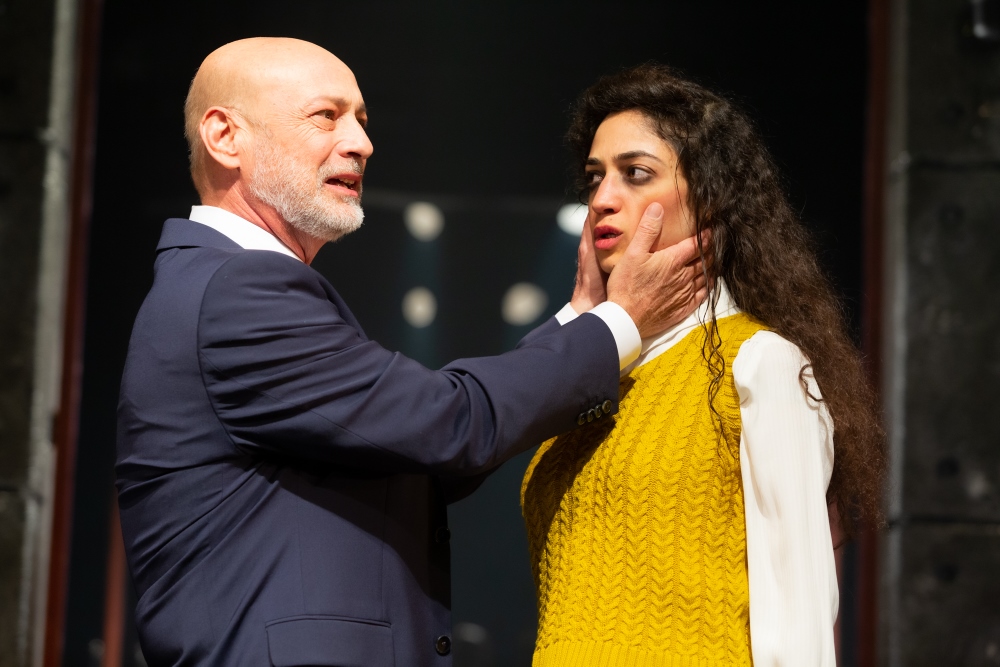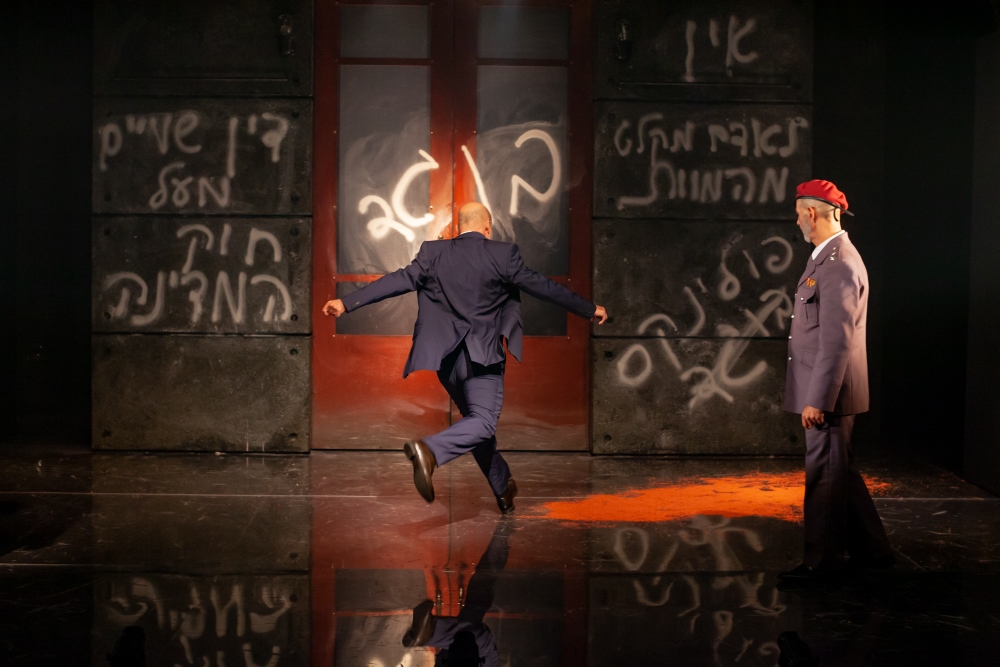
Poetic, contemporary and concise, the Khan Theatre production of Antigone, directed by Udi Ben Moshe, distills the essence of Sophocles’ classic tragedy in a version that speaks directly to the internal conflicts in Israel today. The translation by Shimon Buzaglo flows with the transparency of spoken Hebrew, unhampered by historical or ornamental markers. Modern costumes, designed by Oren Dar, reflect the different social-political-religious spheres of our era, while the set, designed by Svetlana Breger, is deliberately oblique; a blackboard wall with a door in its center, set on an empty stage. As the audience enters, the writing is already on the wall with a graffiti scrawl: “war”, “revenge” and “the state above all.”
The conflict between the law of the state and the law of the gods, sends Creon (Erez Shafrir) and Antigone (Or Lumbrozo) hurtling towards their inevitable fates. In the aftermath of the civil war between Antigone’s brothers Eteocles and Polynices, in which both were killed, Creon, the new ruler, decrees that Eteocles, who was loyal to the state shall receive an honorable funeral, while the rebellious Polynices shall be denied a burial. Antigone is determined to give her brother a religious burial as commanded by the gods. Both state and religion meant something altogether different in Sophocle’s day, yet in the ensuing struggle between Creon and Antigone, one soon discerns the source of the problem: an inability to see or admit the validity of another perspective.
Director Udi Ben Moshe has chosen to begin the play with the cast singing the Ode to Man, set to music composed by Yosef Bardanashvili. In the version of Antigone with which I am familiar (the English translation by Dudley Fitts and Robert Fitzgerald), this is sung by the chorus, after the sentry has come to inform Creon that someone has buried Polynices. The opening phrase presents a good summary of its theme: “Numberless are the world’s wonders, but none more wonderful than man.” The song extols humanity’s many achievements and abilities, only to conclude: “from every wind he has made himself secure––from all but one: In the late wind of death he cannot stand” – ultimately emphasizing humanity’s weakness. Haunting and lovely, the song returns as a motif throughout the play, reminding the viewer: to be human is to be vulnerable.
Her appearance – braided hair, long, pleated skirt, long sleeved blouse and sweater-vest – reminiscent of Ultra-Orthodox modesty codes, at first glance, the most salient feature of Or Lumbrozo’s Antigone is her youth. It is an attribute that is subtly yet intentionally emphasized, a reminder that despite having seen and experienced so much, Antigone is still very young. Her feelings are strong, yet one is cognizant of the fact that her thoughts, opinions and beliefs are still not fully mature. As she speaks to her sister Ismene (Suzanna Papian), the drastic words and extreme actions she proposes, spoken with quiet resolve, lend more impact to her speech. Lumbrozo’s deep and restrained performance is very moving and powerful. As the play progresses, and Antigone is confronted with the consequences of her actions, her dignity and grief invite one’s compassion.
Erez Shafrir brings a confidence tainted with the trace of a smug smile to Creon’s opening speech, when challenged, he becomes more firmly entrenched in his own inciteful speech, yet Shafrir is skillful at revealing the troubled emotions lurking beneath the surface. A necessary lightness is introduced in the character of the sentry (Itai Szor), as he fearfully and comically tells Creon of the burial he has witnessed. The role of the chorus is here portrayed by military and political advisors to Creon – Yossi Eini and Nir Ron, respectively. Following the news that Polynices has received a religious burial, the political advisor suggests to Creon that perhaps this is in fact the will of the gods, yet the latter persists in the certainty that there is only one truth, one way to interpret the will of the gods, and that is his own. Haemon (Shahar Netz) affirms his fidelity to his father, Creon, saying “I am yours,” yet attempts to persuade him to listen to the opinions of others, to no avail. Even Tiresias (Yehoyachin Friedlander) is sent away, his eyes blind but his vision of the future darkly precise, his soul weary of all he has seen.
The theme of religion vs. state is underscored by three characters attired in the typical garb of religious young men with kippot and long earlocks, who appear at intervals to emblazon their slogans on the wall. Yet, I would not interpret the play as depicting a literal equivalence between the narrative depicted in the play and current events. Instead, I feel that it seeks to raise the issues to generate discussion, and perhaps even more so, to encourage listening. In the play’s opening scene, Ismene expresses her fear of going against the law, her fear of punishment and death. As compared to Antigone’s resolute conviction, Ismene appears weak. Yet ultimately, she, who has been guided by love of life, a love for her sister, and a humble sense of her own limitations, survives. As the recurring motif of the Ode to Man reminds us, we are vulnerable.
Antigone by Sophocles
Director: Udi Ben Moshe; Hebrew Translation: Shimon Buzaglo; Set and Design: Svetlana Breger; Costume Design: Oren Dar; Lighting Design: Roni Cohen; Musical Editing: Yosef Bardanashvili; Cast: Erez Shafrir, Or Lumbrozo, Suzanna Papian, Carmit Mesilati-Kaplan, Shachar Netz, Itai Szor, Yehoyachin Friedlander, Yossi Eini, Nir Ron, Meni Gross, Ofer Greenberg, Israel Pniel.






